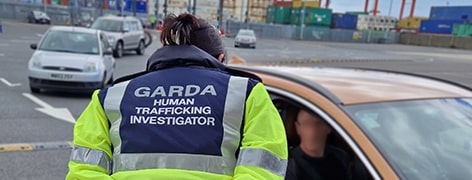 (Pic: RollingNews.ie)
(Pic: RollingNews.ie)
IHREC wants new forced-labour offence
The Irish Human Rights and Equality Commission (IHREC) has called on the Government to address gaps in new legislation on human trafficking that was enacted in July.
It has expressed concerns about labour exploitation, sex-trafficking that is facilitated by technology, and exploitative surrogacy.
Its Third National Anti-Trafficking Report shows that 139 victims of trafficking were identified in Ireland over the three years from 2021 to 2023.
Last year, 53 victims were accepted into the current National Referral Mechanism (NRM) – up 20% compared with 2021.
While IHREC describes this as “a significant rise” in a relatively short period of time, it adds that the capacity to identify victims of trafficking in Ireland has increased, and the State is making advancements in tackling the problem.
‘Gaps’ in legislation
While broadly welcoming the Criminal Law (Sexual Offences and Human Trafficking) Act 2024, IHREC’s report identifies gaps linked to child trafficking, the NRM's equal application for all victims, and statutory protection from prosecution for victims.
It says that these need to be addressed in the promised operational guidelines for the new NRM, which it believes has the potential to be “a game-changer” in identifying supporting and assisting both child and adult victims of trafficking.
The human-rights body cites figures showing that children represent 8% of trafficking victims in Ireland over the past 11 years – well below the EU average of 15%.
“This does not mean, we suspect, that we have fewer child victims. Rather, we believe this is due to the fact that we do not have robust enough systems to identify child trafficking victims,” IHREC states.
“We have a political and moral responsibility to ensure that the new legislation delivers on its potential to defend, protect and support all victims and survivors of human trafficking which is happening in many towns and villages across Ireland,” said Noeline Blackwell (IHREC commissioner).
Technology
The recommendations in its report include a separate child-specific NRM, as well as age assessments, which it describes as “essential” for identifying potential child victims.
IHREC has also called for a stand-alone offence of forced labour and calls for the State to opt in to EU legislation on tracking the minimum standards in the protection of migrant workers.
It also wants action to tackle the upward trend it sees in technology-facilitated trafficking.
International surrogacy
The human-rights body has also expressed concern about the provisions on international surrogacy contained in the Health (Assisted Human Reproduction) Act 2024.
“The commission is concerned that there has not been sufficient time and regard given to the State’s obligation to prevent and combat exploitative surrogacy as a form of human trafficking,” it states.
As the legislation has now been passed, it has called for the setting up of a review process before the provisions on international surrogacy are commenced.
Gazette Desk
Gazette.ie is the daily legal news site of the Law Society of Ireland